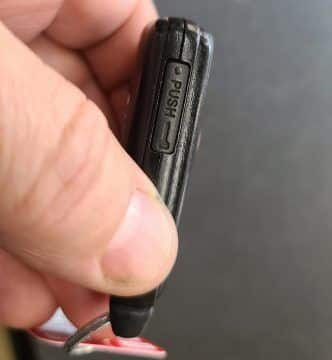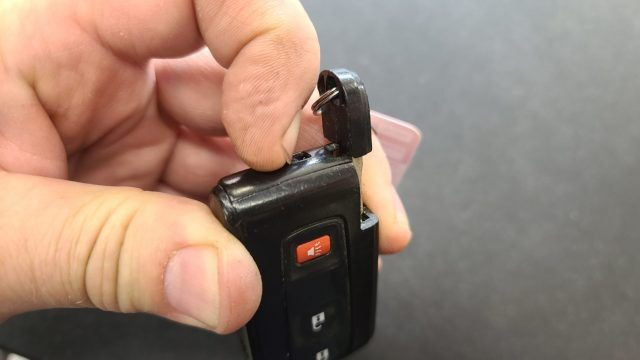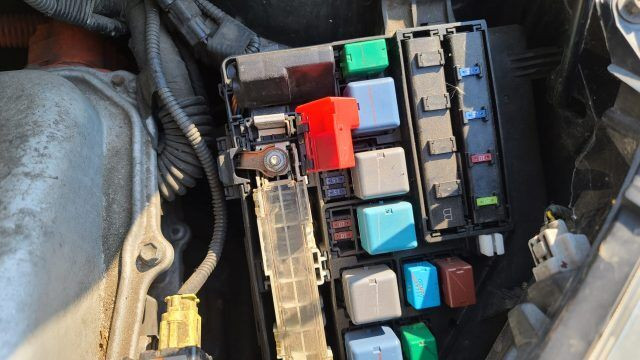Jumpstarting a 2006 Toyota Prius can be a simple task with the right knowledge. At millertoyota.net, we provide expert guidance on how to safely jumpstart your Prius, ensuring you’re back on the road quickly. We will cover everything from accessing the battery terminals to troubleshooting common issues, all while keeping your vehicle’s electrical system safe.
1. Understanding the Unique Challenges of Jumpstarting a 2006 Toyota Prius
Yes, you can jumpstart a 2006 Toyota Prius, but it’s a bit different than a traditional car. Unlike conventional vehicles, the 12V battery in a 2006 Prius is located in the trunk, not under the hood. This presents a challenge because a dead battery also means you can’t open the trunk electronically.
1.1. Why is the Battery Location a Problem?
The trunk of a 2006 Toyota Prius relies on an electric switch and actuator to release the latch. If the 12V battery is dead, these components won’t function, preventing you from accessing the battery directly. Additionally, the smart key, which also requires 12V power, won’t work.
1.2. What are the Potential Risks of Jumpstarting a Prius?
While jumpstarting a Prius doesn’t pose a shock hazard, there are risks involved. Connecting the jumper cables incorrectly can blow the main fuse, a common issue in any car. However, a more significant concern for Prius owners is the potential failure of the DC/DC converter after a reverse polarity jump start. This can lead to costly repairs.
2. Step-by-Step Guide to Jumpstarting Your 2006 Toyota Prius
Follow these steps to safely jumpstart your 2006 Toyota Prius:
2.1. Accessing the Vehicle
2.1.1. Unlocking the Door
If your car was unlocked, simply open the driver’s door. If the door is locked and the smart key isn’t working, don’t worry.
2.1.2. Using the Hidden Key Insert
Smart keys come with a hidden key insert. Locate the retainer (usually a small button or slider) and use your fingernail to release and remove the key insert.
 Removing the Prius emergency key in case the battery goes dead.
Removing the Prius emergency key in case the battery goes dead.
2.1.3. Manually Unlocking the Door
Use the key insert in the driver’s door lock to manually unlock the door.
 prius smart key insert being removed
prius smart key insert being removed
2.2. Finding the Under-Hood Jump Start Port
The 2006 Prius has a dedicated jump start port located under the hood, eliminating the need to access the battery in the trunk directly.
2.2.1. Locating the Jumper Port
The jumper port is situated in the fuse box behind the driver’s side headlight. Look for a small red cover on the fuse box.
2.2.2. Exposing the Positive Terminal
Flip open the red cover to reveal the positive terminal. This terminal is connected to the battery in the trunk.
 Prius jump start terminal 2006 Prius
Prius jump start terminal 2006 Prius
2.3. Connecting the Jumper Cables
2.3.1. Positive Connection
Connect the positive (red) jumper cable clamp to the positive terminal under the hood.
2.3.2. Negative Connection
Connect the negative (black) jumper cable clamp to any unpainted metal part of the engine. A good spot is the inverter cover.
2.4. Starting the Car
2.4.1. Start the Assisting Vehicle
Start the engine of the vehicle providing the jump start and let it run for a few minutes to charge the Prius’s battery.
2.4.2. Start Your Prius
Attempt to start your 2006 Toyota Prius. If it doesn’t start immediately, let the assisting vehicle run for a few more minutes and try again.
2.5. Disconnecting the Jumper Cables
2.5.1. Disconnect in Reverse Order
Once your Prius starts, disconnect the jumper cables in the reverse order you connected them. Remove the negative cable first, followed by the positive cable.
3. Common Issues After Jumpstarting and How to Resolve Them
After jumpstarting your 2006 Prius, you might encounter a few common issues. Here’s how to address them:
3.1. Gas Gauge Blinking on Empty
3.1.1. The Issue
The gas gauge might blink on empty for a short period after a voltage loss. This is a common occurrence and usually resolves itself.
3.1.2. The Solution
Continue driving, and the gas gauge should return to normal after a few minutes.
3.2. Park Lock System Problems
3.2.1. The Issue
You might see a message like “Park your vehicle on level ground and apply the parking brake.” This indicates an issue with the electronic parking pawl system.
3.2.2. The Cause
The Prius uses an electric motor to engage the parking pawl. When the voltage is low, the motor can lose its position and get stuck.
3.2.3. The Solution
- Ensure the booster cables are still connected.
- Press the park button.
- Shift to neutral with the car in the “ON” position (press the power button twice without stepping on the brake pedal).
- Repeat this process until the system relearns its position.
3.3. Car Won’t Go Into Gear
3.3.1. The Issue
The car might seem like it won’t go into gear, preventing you from driving.
3.3.2. The Cause
This usually happens because the car is “ON” but not in “Ready” mode.
3.3.3. The Solution
Make sure the car is in “Ready” mode by fully pressing the brake pedal and pressing the power button once. The “Ready” indicator should light up on the dashboard.
4. Troubleshooting: What if the Prius Still Won’t Start?
If your 2006 Toyota Prius doesn’t start after following the jumpstarting procedure, consider these troubleshooting steps:
4.1. Check the Connections
4.1.1. Ensure Proper Contact
Verify that the jumper cables are securely attached to both the positive and negative terminals. Poor connections can prevent sufficient current flow.
4.1.2. Clean Corroded Terminals
Corrosion on the terminals can impede the flow of electricity. Clean the terminals with a wire brush or a terminal cleaner to ensure a good connection.
4.2. Battery Condition
4.2.1. Test the Battery Voltage
Use a multimeter to check the voltage of the 12V battery. A fully charged battery should read around 12.6 volts. If the voltage is significantly lower, the battery might be beyond recovery.
4.2.2. Load Test the Battery
A load test can determine if the battery can hold a charge under load. Most auto parts stores offer free battery testing services.
4.3. Check the Fuses
4.3.1. Inspect the Main Fuse
A blown main fuse can prevent the car from starting. Check the main fuse located in the fuse box.
4.3.2. Replace Blown Fuses
If you find any blown fuses, replace them with fuses of the same amperage.
4.4. Hybrid System Issues
4.4.1. Hybrid Battery Problems
Although the 12V battery is used to start the car’s systems, a failing hybrid battery can also cause starting problems.
4.4.2. Seek Professional Help
If you suspect an issue with the hybrid battery, it’s best to consult a professional technician.
4.5. Immobilizer System
4.5.1. Key Fob Issues
Sometimes, the immobilizer system might prevent the car from starting if it doesn’t recognize the key fob.
4.5.2. Try a Different Key
Try using a different key fob to see if the car starts. If it does, the original key fob might need reprogramming or replacement.
5. Preventing Future Jump Start Situations
To avoid future jump start scenarios with your 2006 Toyota Prius, consider these preventative measures:
5.1. Regular Battery Maintenance
5.1.1. Inspect the Battery Regularly
Check the battery terminals for corrosion and clean them as needed.
5.1.2. Ensure Secure Connections
Make sure the battery cables are tightly connected to the terminals.
5.2. Avoid Draining the Battery
5.2.1. Turn Off Lights
Ensure all interior and exterior lights are turned off when the car is not in use.
5.2.2. Limit Accessory Use
Avoid leaving accessories like the radio or air conditioning running for extended periods when the engine is off.
5.3. Battery Replacement
5.3.1. Monitor Battery Age
The 12V battery in a Prius typically lasts between 3 to 5 years.
5.3.2. Replace When Necessary
Replace the battery proactively if it’s nearing the end of its expected lifespan or if you notice signs of weakness.
5.4. Professional Inspections
5.4.1. Routine Check-ups
Include a battery inspection as part of your regular maintenance routine at millertoyota.net.
5.4.2. Diagnostic Testing
Have your battery tested periodically to assess its health and performance.
6. Understanding the 12V Battery in a 2006 Toyota Prius
The 12V battery in a 2006 Toyota Prius serves a different purpose than in a conventional car.
6.1. Role of the 12V Battery
6.1.1. Starting the System
The 12V battery is responsible for starting the car’s computer systems, which then initiate the hybrid system.
6.1.2. Powering Accessories
It also powers accessories like lights, radio, and other electrical components.
6.2. Differences from Traditional Cars
6.2.1. Not for Cranking the Engine
Unlike traditional cars, the 12V battery does not directly crank the engine.
6.2.2. Hybrid System Reliance
The hybrid system handles the actual propulsion of the vehicle.
6.3. Battery Types
6.3.1. AGM Batteries
Many Prius models use Absorbed Glass Mat (AGM) batteries, which are more durable and resistant to vibration.
6.3.2. Standard Lead-Acid Batteries
Some models may use standard lead-acid batteries, but AGM batteries are generally recommended for their superior performance.
7. Why Choose Miller Toyota for Your Prius Needs?
At millertoyota.net, we understand the intricacies of the 2006 Toyota Prius and offer specialized services to keep your vehicle running smoothly.
7.1. Expert Technicians
7.1.1. Certified Professionals
Our technicians are certified and trained to work on Toyota hybrid vehicles.
7.1.2. Specialized Knowledge
They possess in-depth knowledge of the Prius’s unique systems and components.
7.2. Comprehensive Services
7.2.1. Battery Services
We offer battery testing, replacement, and maintenance services.
7.2.2. Hybrid System Repairs
Our team is equipped to handle all types of hybrid system repairs.
7.3. Genuine Toyota Parts
7.3.1. Quality Assurance
We use genuine Toyota parts to ensure the highest quality and reliability.
7.3.2. Optimal Performance
Genuine parts are designed to work seamlessly with your Prius, maintaining its performance and longevity.
7.4. Customer Satisfaction
7.4.1. Dedicated Support
We are committed to providing exceptional customer service.
7.4.2. Reliable Solutions
Our goal is to offer reliable solutions that meet your needs and exceed your expectations.
8. The Importance of Regular Maintenance for Your 2006 Toyota Prius
Regular maintenance is crucial for the longevity and reliability of your 2006 Toyota Prius. Here’s why:
8.1. Extends Vehicle Life
8.1.1. Prevents Major Issues
Routine maintenance can identify and address minor issues before they escalate into major problems.
8.1.2. Maintains Performance
Regular servicing ensures your Prius continues to perform at its best.
8.2. Optimizes Fuel Efficiency
8.2.1. Clean Air Filters
Replacing dirty air filters improves engine efficiency and fuel economy.
8.2.2. Proper Tire Inflation
Maintaining proper tire pressure reduces rolling resistance and increases MPG.
8.3. Enhances Safety
8.3.1. Brake Inspections
Regular brake inspections ensure your braking system is functioning correctly.
8.3.2. Tire Condition
Monitoring tire tread depth and condition ensures optimal traction and handling.
8.4. Increases Resale Value
8.4.1. Maintenance Records
Detailed maintenance records demonstrate that your vehicle has been well-cared for.
8.4.2. Higher Value
A well-maintained Prius typically commands a higher resale value.
9. Addressing Common Myths About Jumpstarting Hybrid Vehicles
There are several myths surrounding the jumpstarting of hybrid vehicles like the Toyota Prius. Let’s debunk some of them:
9.1. Myth: Jumpstarting a Prius is Dangerous
9.1.1. Fact: Safe with Proper Procedure
Jumpstarting a Prius is safe as long as you follow the correct procedure and avoid reverse polarity connections.
9.1.2. Precautions
Taking necessary precautions minimizes the risk of damaging the electrical system.
9.2. Myth: You Can’t Jumpstart a Prius
9.2.1. Fact: Jumpstarting is Possible
Prius models can be jumpstarted using the 12V battery or the designated jump start terminals.
9.2.2. Specific Instructions
Follow the manufacturer’s instructions for the specific model year.
9.3. Myth: Jumpstarting Will Damage the Hybrid Battery
9.3.1. Fact: 12V Battery is Separate
Jumpstarting affects the 12V battery, not the high-voltage hybrid battery.
9.3.2. System Isolation
The two systems are isolated, preventing damage to the hybrid battery during a jump start.
9.4. Myth: Any Car Battery Can Be Used to Jumpstart a Prius
9.4.1. Fact: Use Appropriate Voltage
Use a 12V battery from another vehicle to jumpstart a Prius.
9.4.2. Avoid High Voltage
Avoid using high-voltage sources, as they can damage the Prius’s electrical system.
10. Frequently Asked Questions (FAQ) About Jumpstarting a 2006 Toyota Prius
10.1. Can I use any car to jumpstart my 2006 Toyota Prius?
Yes, you can use any car with a 12V battery to jumpstart your 2006 Toyota Prius. Ensure both vehicles are turned off before connecting the jumper cables to avoid electrical surges.
10.2. What if the trunk of my 2006 Prius won’t open when the battery is dead?
The 2006 Prius has a jump start terminal under the hood. Use that, so you do not have to open the trunk. Follow the steps outlined earlier in this article to locate and use the jump start terminal.
10.3. How long should I let the other car run while jumpstarting my Prius?
Let the other car run for about 5-10 minutes to allow some charge to flow into the Prius’s battery. This will help ensure that your Prius has enough power to start.
10.4. What does it mean if my Prius won’t go into gear after jumpstarting?
If your Prius won’t go into gear after jumpstarting, it may be due to the electronic parking pawl system needing to relearn its position. Try pressing the park button, then shifting to neutral with the car in the ON position (press the power button twice without stepping on the brake pedal) until the system resets.
10.5. How do I know if my 12V battery needs to be replaced?
Signs that your 12V battery needs to be replaced include frequent jump starts, dimming headlights, slow starting, and a battery voltage below 12.4V when tested with a multimeter.
10.6. Is it safe to jumpstart a Prius in the rain?
It’s best to avoid jumpstarting a Prius in the rain due to the risk of electrical shock. If it’s unavoidable, take extra precautions to keep yourself and the jumper cables as dry as possible.
10.7. What if I connect the jumper cables backwards by accident?
If you accidentally connect the jumper cables backwards, it can blow the main fuse and potentially damage the DC/DC converter. Check the fuses and replace any that are blown. If the car still doesn’t start, consult a professional technician.
10.8. Can I jumpstart a Prius with a jump box?
Yes, you can jumpstart a Prius with a jump box, which is a portable battery jump starter. Follow the same connection procedure as with jumper cables, ensuring the jump box is fully charged.
10.9. How often should I replace the 12V battery in my 2006 Toyota Prius?
The 12V battery in a 2006 Toyota Prius typically lasts between 3 to 5 years, depending on usage and environmental conditions.
10.10. Where can I get my Prius battery tested in Boise, Idaho?
You can get your Prius battery tested at Miller Toyota in Boise, Idaho. We offer comprehensive battery services, including testing, replacement, and maintenance. Contact us at millertoyota.net or call +1 (208) 376-8888 to schedule an appointment. Our address is 208 N Maple Grove Rd, Boise, ID 83704, United States.
Understanding how to safely jumpstart your 2006 Toyota Prius can save you time and money. For more detailed information, service appointments, and expert advice, visit us at millertoyota.net. We’re here to help you keep your Prius running smoothly.